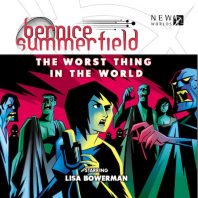
Released September 2006
Scathing commentary about the tedium of televised medium as a whole, the state of reality television in particular, and the propensity for drumming up drama from blatantly false circumstances is at the forefront of ‘The Worst Thing in the World’ by Dave Stone as Bernice and Jason explore the Drome, a self-contained community designed to constantly provide content to the GalNet media stream. But with the machine destroying minds and heightening murderous drives as the people are forced to stumble though clunky twists and turns, Bernice finds herself in a fight for her life with only one means of escape.
This may be the most profane Bernice Summerfield adventure yet, but this language is used well to develop this world where every action and word is amplified to the maximum. Indeed, having Jason whose personality is much more at home in this world of bad dramas and comedies take the initial lead for the first portion of the story as he attempts to garner publicity for his books proves to be a clever way of introducing the world while allowing Bernice a natural and personal entry point when a murder at the hands of an eighteenth-century highwayman occurs and Jason requests her help. This is a world populated by performers and technicians who live in homes that also serve as sets; with so many programming slots to fill there’s something for everyone, and Lisa Bowerman and Stephen Fewell give immense performances in the wide selection of parodied material on display in a list of programmes that includes the likes of cooking shows featuring chefs armed with knives, a show where contestants guess which limb is missing from a person, another where contestants guess whose stool is on display, the most ostentatious soap opera yet, and so much more.
It’s no surprise that Bernice claims that period costume dramas where no surprises can happen are her favourite, though Frock and Fanny here may give that claim a run for its money. The transputer system installed here is capable of so much more than just what the Drome is achieving, but something is going wrong as actors are taking their parts too far and even the period pieces are becoming far too visceral. With costumes and props becoming real as deaths continue to mount, the setup of the Drome comes under scrutiny as history seems to be repeating itself and a singularity that hit Earth in the twenty-first century and changed the experience of reality is remembered. The Drome has inadvertently replicated those circumstances, and the role of the artificial intelligence that lives up to its god grading while just trying to achieve its purpose is an interesting conceit that brings with it a certain degree of logic. With the story needing an end and Bernice’s own life at stake, Bernice turns to the only genre she can think of that doesn’t feature an amassing death toll, the bright musical, and the climax is unexpectedly one of the most fantastic scenes that Big Finish has ever produced that proves just how wildlyunpredictable this range is at any and all times.
The idea of the Drome isn’t a unique one by itself, but Stone’s inclusion of his thoughts on narratives and authorial involvement help to craft a more personal element in a story that is filled with bombastic visuals and glitz that the sound design and music complement expertly. The sheer number of programmes that come to life here does mean that the true plot and the guest characters are given less time to develop than is typical, but this rollercoaster story that firmly believes that people should be people rather than just plot devices perfectly suits Stone’s more unstructured strengths and is sure to provide something for everyone as it races along from one scene to the next.
- Release Date: 9/2006


Leave a Reply